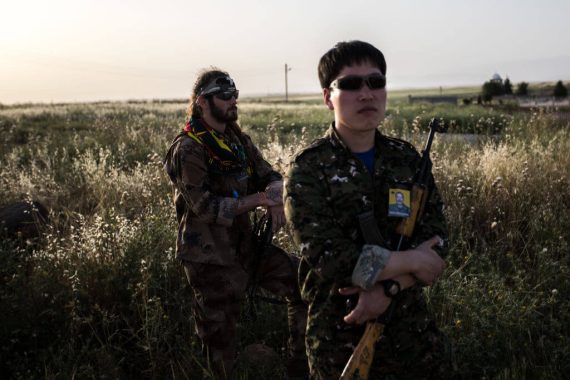The phenomenon of foreign (terrorist) fighters recently became a matter of international politics when U.S. President Donald Trump made an abrupt call to European countries, chiefly Britain, France, and Germany, to take back their citizens who have been foreign terrorist fighters (FTFs) in the ranks of DAESH and who now are prisoners in Syria. What made the issue a bone of contention further especially across Europe was the call by Shamima Begum, a British teenager who had joined DAESH four years ago, who requested to return to the United Kingdom. The British government’s response was stripping her of British citizenship.
Needless to say, no country is willing to take back its citizens who have been in the ranks of DAESH one way or another in Syria and Iraq. The issue is so much a concern for countries so that there are even a United Nations Security Council resolution (2178) specifically targeting foreign fighters. To some extent, countries are right to be concerned about the implications of accepting their citizens back, who have been in war-zones for a while as members of terrorist organizations. It is possible to mention a number of threats that FTF returnees are likely to pose, on which there is also a quasi-consensus in the literature.
First of all, a significant source of concern is the fact that FTFs –most of the time- gain battlefield skills during their time in the ranks of a terrorist organization, unless they are deemed “extremely useless” and employed in trivial jobs such as cooking. This makes them experienced militants with abilities to use different types of weaponry and in some cases improvising explosive devices as well as bomb disposal.
Secondly, FTFs are exposed to ideological indoctrination of the organization they join not less than the indigenous militants. Ideological indoctrination aims at instilling a different conscious and a different set of “values” in the members of the organization. Furthermore, it helps to make the militants identify more with the “cause” of the organization, provide and maintain the motivation to fight for it and turn a mere sympathizer into a reckless militant.
Thirdly, FTFs have a higher propensity to use violence in case they return to their country of origin, compared to the home-grown sympathizers or members of a terrorist organization. This is due to the fact that they experience real war and violence in war-zones and this “socialization” with violence makes it more “normal” for FTFs to carry out a violent act with more ease and skill.
Fourthly, FTF returnees would be in contact with networks or sleeper cells of the terrorist organization in their home country. These contacts could either be developed overseas or returnees might come back with certain references.
Foreign terrorist fighters gain battlefield skills during their time in the ranks of a terrorist organization and this makes them experienced militants with abilities to use different types of weaponry.
Recommended
All of these potential threats that the FTF returnees of a terrorist organization, say DAESH pose, apply to FTF returnees of the YPG – the PKK’s offshoot in northern Syria, without any exception. Still, it is almost impossible to see a similar stance politically and legally towards the latter in case of return. Nor do they spark a Europe-wide controversy as did DAESH’s Shamima Begum. For instance, none of the FTF returnees of the YPG have been stripped of citizenship before and after their return so far.
There are instances of interrogation and prosecution of YPG’s FTFs especially in the U.K. and Australia but none of their cases were handled similar to the ones of DAESH and none of them faced a serious prison sentence. Moreover, they are not even deemed as “foreign fighters” in mass media accounts, but as “volunteers,” which also shapes the public discourse and perception of these FTFs. In addition, some of the FTF returnees of the YPG have been interviewed by major media outlets and they even wrote opinion pieces on those media outlets such as the BBC, The Independent, The Guardian, Daily Telegraph, and Daily Mail, which is inconceivable for their DAESH counterparts.
This conspicuous difference in the treatments of FTFs of DAESH and the YPG stems from the difference in the perception of the two in the eyes of both governments and the public with regards to the threat they pose. In fact, the YPG/PKK has not carried out outrageous attacks such as bombings and ramming vehicles into crowds in European cities so far as DAESH has. Nevertheless, both FTF returnees of the YPG and indigenous PKK members in Western countries have engaged in different sorts of crimes and violence than those of DAESH. To illustrate, a number of FTF returnees of the YPG have been making propaganda for YPG mostly through their social media accounts and also through other online platforms. Likewise, some of them got into the act of recruitment for the YPG, again through online platforms. On the other hand, an FTF returnee of the YPG was involved in a monstrous murder once he returned to his home country.
All potential threats posed by foreign terrorist fighters that returned from DAESH also apply to those that returned from the YPG. Still, it is almost impossible to see a similar stance politically and legally towards the latter in case of return.
Apart from these materialized crimes and violence, there are also other potential threats that would likely be posed by the FTF returnees of YPG upon their return to their home countries. Firstly, although nothing has been reported as such, it is very likely that a considerable number of FTFs suffer from PTSD since they were exposed to extreme levels of violence in Syria. It is already known that some were suicidal even before travelling to the war zone in Syria.
Secondly, they are likely to target state institutions in case of a disagreement with a given policy. This was showcased by PKK members two weeks ago as they attacked the Council of Europe HQ in Strasbourg and injured three policemen. Thirdly, they are likely to engage in PKK’s crime and terror activities in their home countries such as vandalism against especially Turkish state properties, attacks on Turks and Kurds who are not PKK supporters and violent demonstrations. These were already undertaken by indigenous PKK members in European countries many times and it is a matter of time for FTF returnees of the YPG to follow suit.
Despite the disregard by governments and public in Western countries towards the threats or risks that are already posed and are likely to be posed by FTF returnees of the YPG, a considerable element of instability and violence is simmering in their bosom. Western governments should take the issue of FTF returnees of the YPG seriously at least for the sake of their own public order and stability if not for taking an ethical stance by not differentiating between two terrorist organizations.





